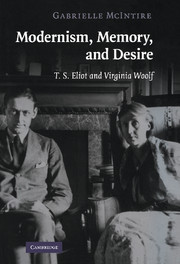Book contents
- Frontmatter
- Contents
- Illustration
- Acknowledgments
- Introduction
- 1 An unexpected beginning: sex, race, and history in T. S. Eliot's Columbo and Bolo poems
- 2 Mixing memory and desire: rereading Eliot and the body of history
- 3 Eliot, eros, and desire: “Oh, do not ask, ‘What is it?’”
- 4 T. S. Eliot: writing time and blasting memory
- 5 Virginia Woolf, (auto)biography, and the eros of memory: reading Orlando
- 6 Other kinds of autobiographies: sketching the past, forgetting Freud, and reaching the lighthouse
- 7 Remembering what has “almost already been forgotten”: where memory touches history
- Epilogue
- Notes
- Index
3 - Eliot, eros, and desire: “Oh, do not ask, ‘What is it?’”
Published online by Cambridge University Press: 22 September 2009
- Frontmatter
- Contents
- Illustration
- Acknowledgments
- Introduction
- 1 An unexpected beginning: sex, race, and history in T. S. Eliot's Columbo and Bolo poems
- 2 Mixing memory and desire: rereading Eliot and the body of history
- 3 Eliot, eros, and desire: “Oh, do not ask, ‘What is it?’”
- 4 T. S. Eliot: writing time and blasting memory
- 5 Virginia Woolf, (auto)biography, and the eros of memory: reading Orlando
- 6 Other kinds of autobiographies: sketching the past, forgetting Freud, and reaching the lighthouse
- 7 Remembering what has “almost already been forgotten”: where memory touches history
- Epilogue
- Notes
- Index
Summary
“Sibyl, what do you want?” “I want to die.”
T. S. Eliot, epigraph to The Waste LandMemory!
You have the key,
The little lamp spreads a ring on the stair.
Mount.
The bed is open …
T. S. Eliot, “Rhapsody on a Windy Night”In September of 1914, shortly after Eliot's arrival in England from Germany, where he had been studying until the outbreak of what would become the Great War, and in a letter that includes a sodomitical stanza that he (perhaps jokingly) claims he submitted for a hundred-dollar prize, Eliot writes to Conrad Aiken praising the kindness of Ezra Pound, his new friend, and noting Pound's support of Eliot's poetic endeavors. In the same letter Eliot expresses a deep anxiety about his poetic career and his level of productivity:
Pound has been on n'est pas plus aimable, and is going to print “Prufrock” in Poetry and pay me for it. He wants me to bring out a Vol. after the War. The devil of it is that I have done nothing good since J. A[lfred] P[rufrock] and writhe in impotence … I think now that all my good stuff was done before I had begun to worry – three years ago.
Eliot's self-critical judgment about the quality of his work is allied with a discomfort which he describes in terms remarkably akin to the corporeal frustrations of sexual “impotence” – explicitly associating poetic productivity with a more youthful blithe spirit and virility.
- Type
- Chapter
- Information
- Modernism, Memory, and DesireT. S. Eliot and Virginia Woolf, pp. 75 - 100Publisher: Cambridge University PressPrint publication year: 2008



